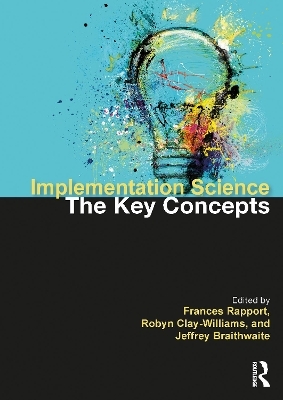
Implementation Science
Routledge (Verlag)
978-0-367-62611-2 (ISBN)
This accessible textbook introduces a wide spectrum of ideas, approaches, and examples that make up the emerging field of implementation science, including implementation theory, processes and methods, data collection and analysis, brokering interest on the ground, and sustainable implementation.
Containing over 60 concise essays, each addressing the thorny problem of how we can make care more evidence-informed, this book looks at how implementation science should be defined, how it can be conducted, and how it is assessed. It offers vital insight into how research findings that are derived from healthcare contexts can help make sense of service delivery and patient encounters. Each entry concentrates on an important concept and examines the idea’s evidence base, root causes and effects, ideas and applications, and methodologies and methods. Revealing a very human side to caregiving, but also tackling its more complex and technological aspects, the contributors draw on real-life healthcare examples to look both at why things go right in introducing a new intervention and at what can go wrong. Implementation Science: The Key Concepts provides a toolbox of rich, contemporary thought from leading international thinkers, clearly and succinctly delivered.
This comprehensive and enlightening range of ideas and examples brought together in one place is essential reading for all students, researchers, and practitioners with an interest in translating knowledge into practice in healthcare.
Frances Rapport is Professor of Health Implementation Science at Macquarie University’s Centre for Healthcare Resilience and Implementation Science, Sydney, Australia, is Academic Lead, MD Research, Macquarie University, and holds an Honorary Chair as Professor of Qualitative Health Research at Swansea University’s Medical School, UK. She currently leads a team of implementation scientists examining new models of implementation to support the translation of research outcomes into practical solutions for healthcare delivery and improvement. Rapport has a visiting professorship in Bournemouth University, UK, and was previously a visiting professor at Harvard University (Psychiatry), Texas University, Galveston (Medical Board), and the University of Tromsø (Medical Humanities) in Norway. Robyn Clay-Williams is Associate Professor of Human Factors and Resilience and an internationally regarded health services researcher, who leads a research stream at the Australian Institute of Health and Innovation (AIHI), Macquarie University, Sydney, Australia. Her expertise is in creating health systems that can function effectively in the presence of complexity and uncertainty. Dr Clay-Williams’ research bridges the gap between theory and practice by developing products and processes that are usable and ready for implementation. She has a background in aviation and, prior to her academic career, was a military test pilot with the Royal Australian Air Force. Jeffrey Braithwaite is Founding Director of the AIHI, Director of the Centre for Healthcare Resilience and Implementation Science, and Professor of Health Systems Research, Faculty of Medicine, Health and Human Sciences, Macquarie University, Sydney, Australia. He has appointments at six other universities internationally, and he is a board member and President of the International Society for Quality in Health Care (ISQua) and consultant to the World Health Organization (WHO). Working with 152 countries on their reform initiatives, his research on safer, higher quality, and more resilient care examines health systems and their capacity to implement change and improvement, attracting funding of more than AUD 171 million. He is particularly interested in healthcare as a Complex Adaptive System and applying complexity science to healthcare problems.
Part I Principles and Concepts of Implementation Science. 1.Complexity Science. 2.Taking a Systems View. 3.Resilience Changes the Lens for Healthcare Implementation Systems. 4.Implementation Systems That Support Resilient Performance. 5.Principles of Implementation Science. 6.Medical Humanism: The Role of Character in Implementation Science. 7.Theorizing. 8.Theories, Models, and Frameworks in Implementation Science: A Taxonomy. 9.The Consolidated Framework for Implementation Research (CFIR). 10.The Theoretical Domains Framework. 11.Organization Theory for Implementation Science. 12.Exploration, Preparation, Implementation, Sustainment (EPIS) Framework. 13.Implementation Science as Process Ecology: Normalization Process Theory. 14.Diffusion of Innovation Theory. 15.Health-related Quality of Life. 16.Shared Decision Making: Consider Context. 17.Core Aspects of Nudge as a Behaviour Change Paradigm in Implementation Science. 18.Pipeline and Cyclical Models of Evidence Building: The Roles of Implementation Research. Part II Methodology and Methods of Implementation Science. 19.Application. 20.Plan, Do, Study, Act (PDSA). 21 Formative Evaluation Feedback Loops 22.Implementation or Continuous Design? The Contribution of Human Factors and Engineering to Healthcare Quality and Patient Safety. 23.Core and Variation Components. 24.Sensemaking: Appreciating Patterns and Coherence in Complexity. 25.Methodological Diversity. 26.Applying the Theoretical Domains Framework: Its Uses and Limitations. 27.Ethnography. 28.Walking Methods. 29.Modelling Complex Socio-Technical Systems: The Functional Resonance Analysis Method (FRAM). 30.Getting a handle on the social processes of implementation: Social network research. 31.Sentiment Analysis for Use within Rapid Implementation Research: How Far and Fast Can We Go? 32.Mixed Method Design. 33.Simulation to Improve Patient Care. 34.In Situ Simulation. 35.Emergency Implementation Science. 36.Planning for Implementation: Why, Who, and How. 37.Consensus Building: A Key Concept in Implementation Science. 38.Nudge: Finding Clues and Using Cues to Shift Clinician Behaviour. 39.Design and Implementation of Dashboards in Healthcare. 40.Sensemaking: Paying Attention to the Stories We Tell to Improve Our Ability to Act. 41.Adaptations. Part III Challenges with Evidence into Practice: Translation, Evaluation, Sustainability. 42.Evidence Synthesis: Maximizing the Potential. 43.Theory-driven Evaluation. 44.Process Evaluation of Implementation Strategies. 45.Dissemination. 46.A Learning Perspective on Implementation. 47.Alignment: Impact on Implementation Processes and Outcomes. 48.Work-as-Imagined and Work-as-Done. 49.Leading Implementation by Focusing on Strategic Implementation Leadership. 50.Agents of Change: The Example of an Allied Health Professional. 51.Clinical Decision Support. 52.Interprofessional Team Working: The Case of Care Pathways. 53.Older People’s Care. 54.Implementation Interventions to Enhance Patient Self-management. 55.Complex Systems and Unintended Consequences. 56.The Nature and Need for Slack in Healthcare Services. 57.Diagnosis Errors. 58."Scaling-Out" Evidence-based Practices. 59.Implementation Sustainability. 60.De-implementation.
| Erscheinungsdatum | 30.05.2022 |
|---|---|
| Reihe/Serie | Routledge Key Guides |
| Zusatzinfo | 7 Tables, black and white; 32 Line drawings, black and white; 7 Halftones, black and white; 39 Illustrations, black and white |
| Verlagsort | London |
| Sprache | englisch |
| Maße | 174 x 246 mm |
| Gewicht | 540 g |
| Themenwelt | Sachbuch/Ratgeber ► Gesundheit / Leben / Psychologie |
| Medizin / Pharmazie ► Allgemeines / Lexika | |
| Pflege ► Studiengänge ► Pflegewissenschaft | |
| Studium ► Querschnittsbereiche ► Prävention / Gesundheitsförderung | |
| ISBN-10 | 0-367-62611-X / 036762611X |
| ISBN-13 | 978-0-367-62611-2 / 9780367626112 |
| Zustand | Neuware |
| Haben Sie eine Frage zum Produkt? |
aus dem Bereich


